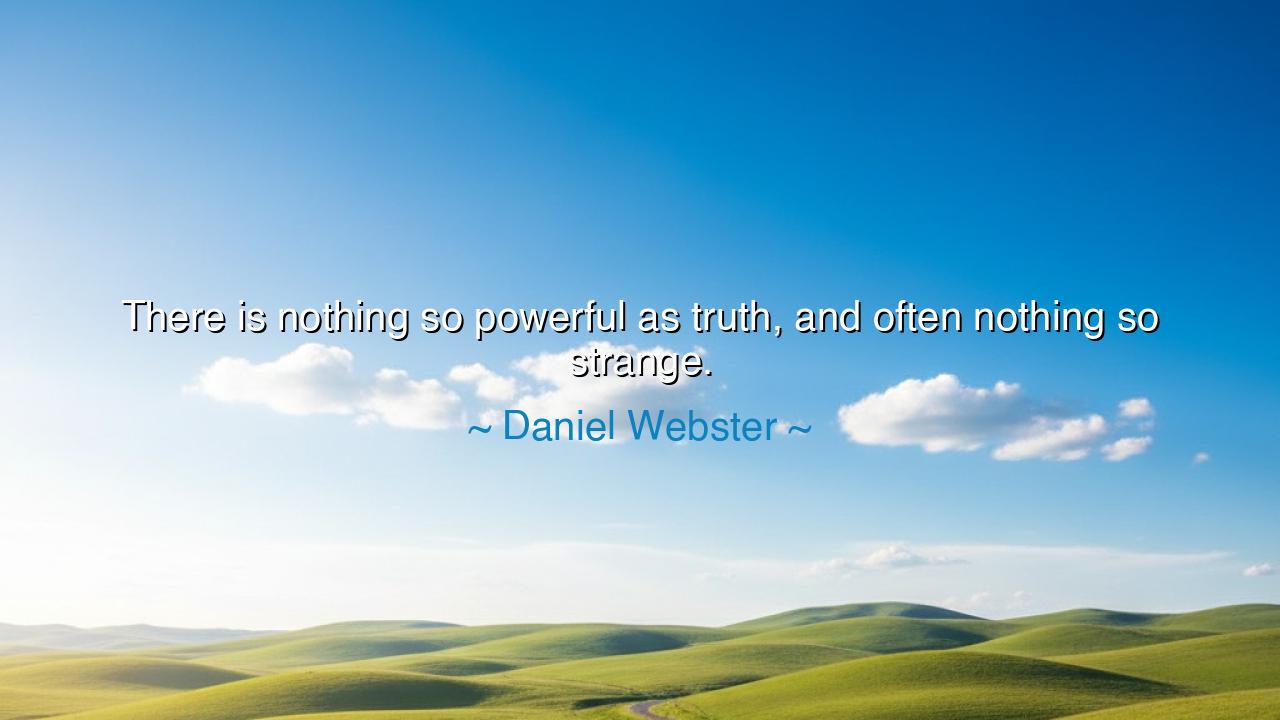
There is nothing so powerful as truth, and often nothing so






Hear now the voice of Daniel Webster, the great orator of America, who declared: “There is nothing so powerful as truth, and often nothing so strange.” These words carry the weight of thunder, for they speak to the double nature of truth. It is a force mighty enough to overturn kingdoms, to unmask deception, and to shatter chains. Yet it is also strange, for it often defies expectation, appearing in ways that shock, confuse, or humble those who encounter it. Thus, truth is both the strongest and the strangest of companions in the journey of human life.
The power of truth is beyond dispute. No empire can stand forever on lies, no tyrant can silence reality with decrees, no falsehood can endure the judgment of time. The river of truth may be dammed for a season, but eventually it breaks through, sweeping away the barriers of deceit. Webster himself, standing in the courts and in the halls of Congress, wielded truth like a sword—cutting through arguments with clarity, appealing to the eternal principles of justice and law. To him, truth was not a decoration but the very foundation of freedom.
Yet Webster was wise to add that truth is often strange. For when truth is revealed, it does not always conform to what men expect. It unsettles. It exposes hidden things. It demands that we abandon long-cherished illusions. Consider the tale of Galileo Galilei, who looked to the heavens and discovered that the earth was not the center of the universe. This truth was powerful, but also strange, so strange that it shook the foundations of faith and authority in his time. Men resisted it, for it contradicted their vision of the world. And yet, no matter how much they condemned him, the truth endured, reshaping human understanding of the cosmos.
So too in the annals of history, the truth of slavery was strange to those who profited from it. They told themselves it was natural, that it was ordained, that it was necessary. Yet the truth—that all men are created equal—rose like fire in the words of abolitionists and in the lives of the enslaved who dared to resist. It was strange because it opposed centuries of practice, yet it was powerful because it could not be denied. In time, this truth brought down institutions that seemed immovable, and its power continues to echo in every struggle for human dignity.
We must not fear the strangeness of truth, for it is in that strangeness that transformation begins. What seems strange today may become tomorrow’s wisdom. The discovery of vaccines, the unveiling of human rights, the recognition of new ideas—each truth, when first revealed, seemed foreign, uncomfortable, even dangerous. But by embracing it, humanity grew stronger, wiser, freer. Thus, the strangeness of truth is not a weakness but a sign of its ability to expand the horizons of human thought.
What lesson, then, shall we carry? First, to honor the power of truth, never to despise it, even when it breaks our illusions. Second, to welcome its strangeness, for the truths that feel unfamiliar are often those that lead us to new paths of growth. Do not cling too tightly to the comfort of what is familiar, for truth rarely leaves us unchanged. Instead, walk in humility, with open eyes and a steadfast heart, ready to be surprised by what is real.
And so, my child, let Daniel Webster’s words be carved upon your memory: truth is the most powerful force in the world, yet often the most strange. Seek it, embrace it, and live by it, even when it unsettles you. For though it may appear strange, though it may overturn what you once believed, it will also set you free. And in the end, no lie, no illusion, no empire of falsehood can prevail against the eternal power of truth.






KTkhai tran
I find Webster’s observation fascinating because it captures the essence of how truth operates in our lives. Truth often challenges us, revealing things we may not want to face. Is this why it’s so powerful? Could truth be considered powerful because it has the ability to shatter our illusions, even though it feels strange and uncomfortable? How do we reconcile this tension between truth’s power and its strangeness in our everyday experiences?
VTVy Thuy
This quote makes me think about the times in history when truth has been hidden, twisted, or ignored because it was too powerful or too strange. It’s almost as if the truth, in its purest form, carries a weight that many are unprepared to bear. Does this mean we have a natural resistance to truth because of its potential to disrupt our understanding of the world? Can truth ever be fully accepted without this feeling of strangeness?
VKTran Vinh Khang
Webster’s statement suggests that truth is a double-edged sword—capable of great power, yet often unsettling. I wonder, though, does the strangeness of truth make it harder to accept or embrace? How does society deal with uncomfortable truths that challenge the status quo? Are we more likely to reject something strange, even if it holds the power to change us? Can the power of truth ever be fully realized if we resist its strangeness?
CCChao Chau
Daniel Webster’s quote about the power and strangeness of truth strikes me as a powerful reminder that truth is both a force of immense strength and something that often defies expectation. But why is truth so strange? Does it feel strange because it’s not always what we want to hear, or because it exposes the complexities of life that we might prefer to ignore? Is truth’s strangeness what makes it so compelling?